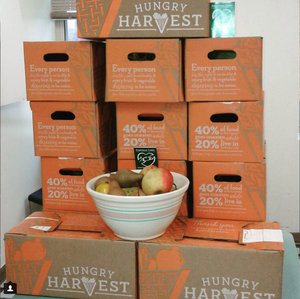

If the vegetables inside these boxes were never destined for the landfill, then the growth of ugly-produce companies threatens to make the food waste problem worse, according to co-author Eric Holt-Gimenez, the executive director of Food First. that commodifies and gentrifies food waste.” The company, they argued, is not in the business of food waste so much food surplus: It buys excess products that farmers can’t sell to supermarkets, but could sell to restaurants, canned and processed food companies, or, as a last resort, donate to food banks. “The stuff in these boxes is not ending up in a landfill,” co-author Max Cadji, the founder of Phat Beets Produce, told me. “They’re just tapping into the same marketplace as the guys who make shredded carrots.” In an op-ed last year for The New Food Economy, the heads of two food-justice nonprofits in Oakland wrote that Imperfect Produce “ reflects a very troubling trend. “The stuff in these boxes is not ending up in a landfill.”Īs these delivery services have grown, though, so have their critics. Simon envisions Imperfect delivering in “all major metropolitan centers on the East Coast by the end of 2020.” NBA superstar Kevin Durant recently announced an investment in the company. It now delivers boxes in six cities on the East Coast, and CEO Evan Lutz says he plans to expand the business “to 30 more cities over the next four years.” Imperfect Produce-founded in 2015 by one of Lutz’s original business partners, Ben Simon-serves 10 West Coast cities, as well as Baltimore and Washington, D.C.
#Cancel hungry harvest series
More consumers are doing just that. Founded in 2014, Hungry Harvest was propelled by a $100,000 investment through the popular TV series Shark Tank.

In an op-ed for The Washington Post, Frischmann wrote that reducing food waste will ultimately require American consumers to “e mbrace ‘ugly food’-fruits and vegetables that are blemished and not perfectly shaped but are perfectly delicious and nutritious.” In fact, reducing food waste is “one of the most important things we can do to reverse global warming,” according to Chad Frischmann, policy director of the climate solutions group Project Drawdown.

The latter is particularly concerning since nitrogen-based fertilizer is a major cause of water contamination and a significant emitter of greenhouse gases. I even wonder whether the planet would be better off if I threw the next orange-and-brown box in the trash.įood waste doesn’t make many headlines, but it’s one of the biggest environmental problems in the United States. Every year, 30 million acres of cropland, 4.2 trillion gallons of water, and nearly two billion pounds of fertilizer are used to grow food that’s never eaten, according to a recent study. But after looking deeper into these companies, I now question the entire concept of “rescuing” excess produce for profit. If c ompanies could find a way to profit from unwanted food, maybe there was an economically sustainable solution to this crisis. On balance, that seemed like a positive development. The “ugly produce” movement had been monetized, and it was becoming a big business. Hungry Harvest ads started appearing in my Instagram and Facebook feeds, and ads for a competing food waste delivery company, Imperfect Produce, even popped up while I was swiping on Tinder. They were piling up in my mailroom and appearing on my neighbors’ doorsteps. I would bring it upstairs and marvel at its contents: tiny avocados, bruised pears, hilariously oversized eggplants. I’d arrange the strange produce in bowls on my dining room table.Īfter a few months, I started noticing orange-and-brown cardboard boxes everywhere. I felt a twinge of pride when, every other Sunday morning, an orange-and-brown cardboard box showed up in the mailroom of my apartment building.


 0 kommentar(er)
0 kommentar(er)
